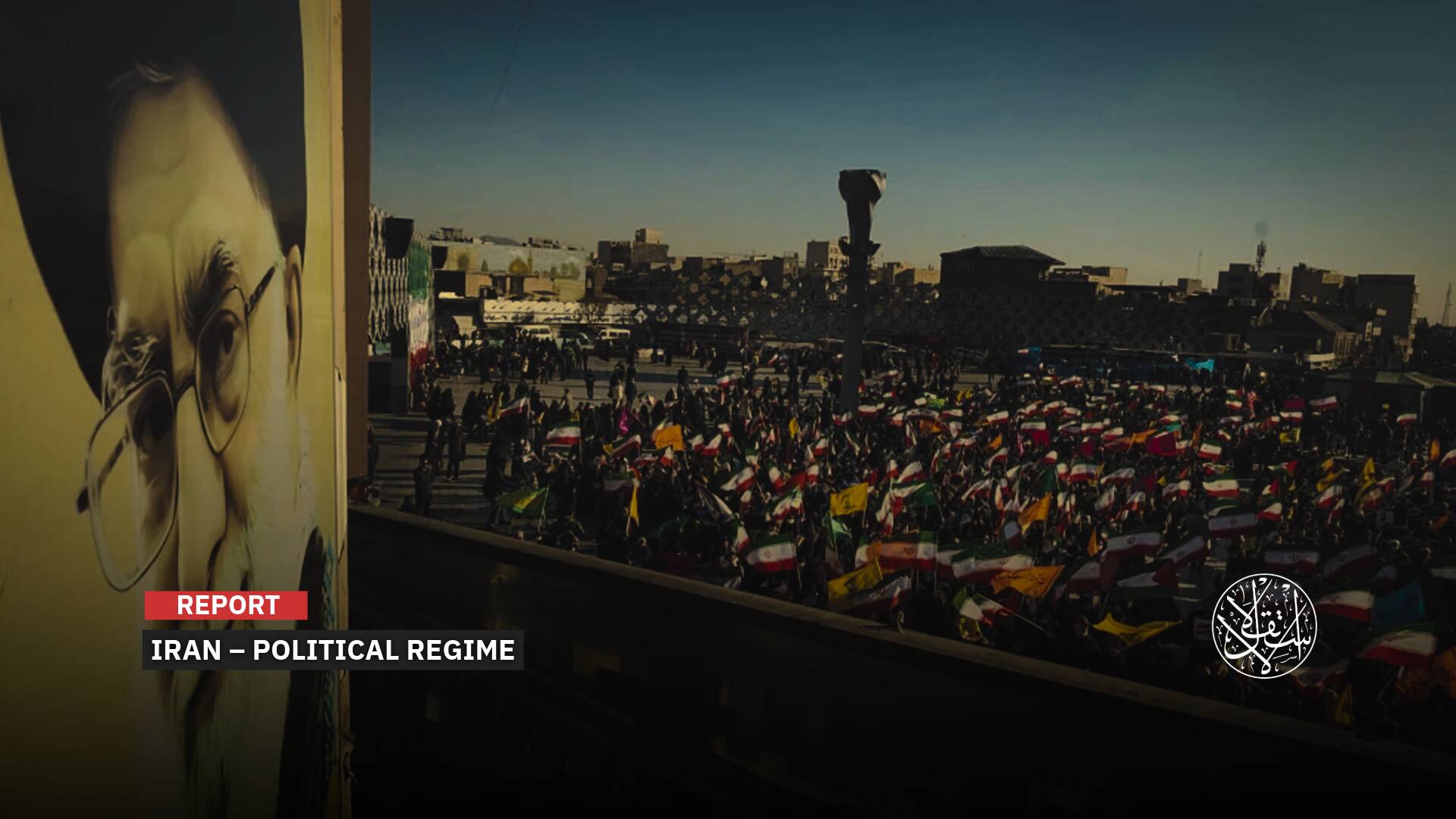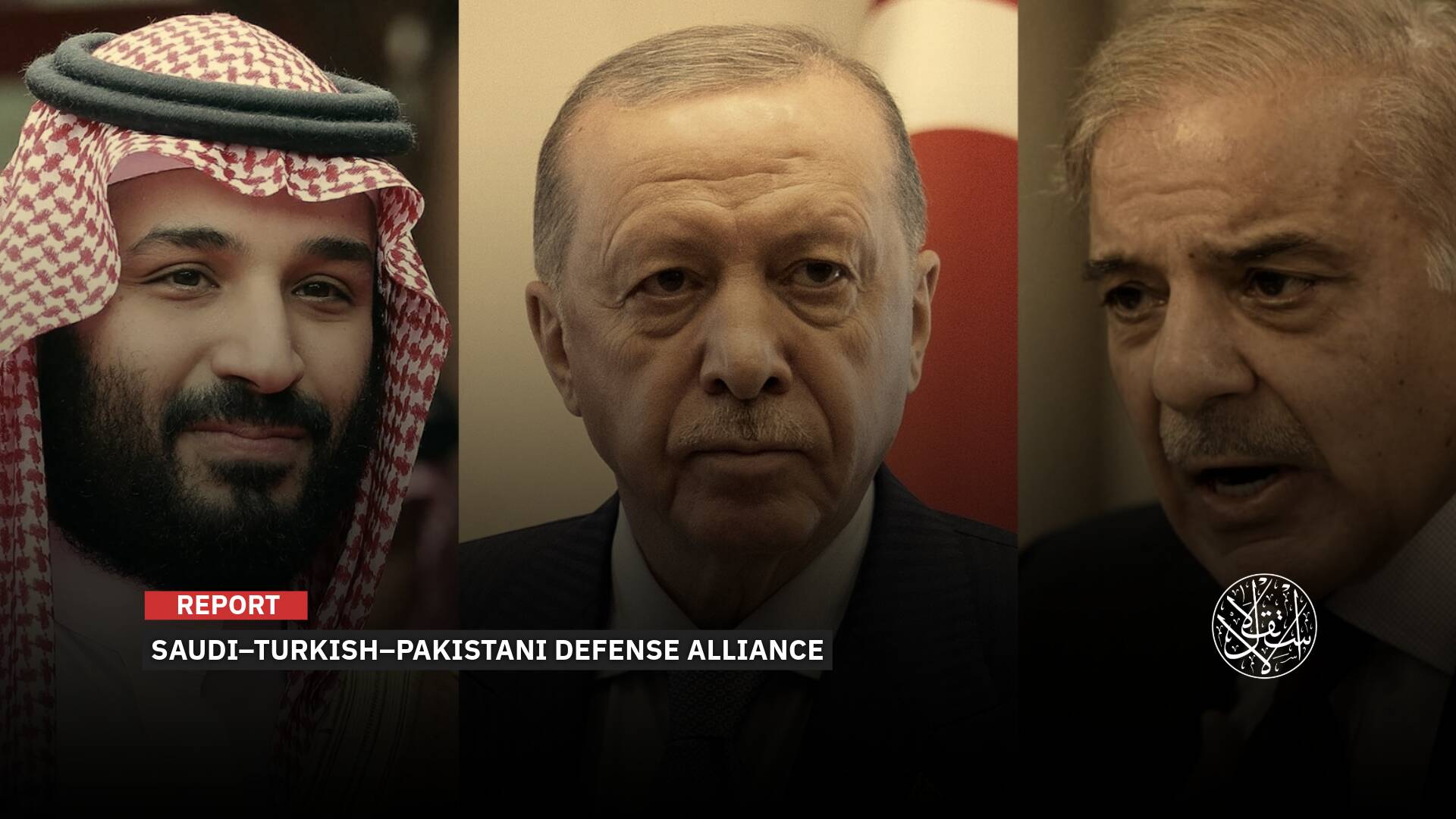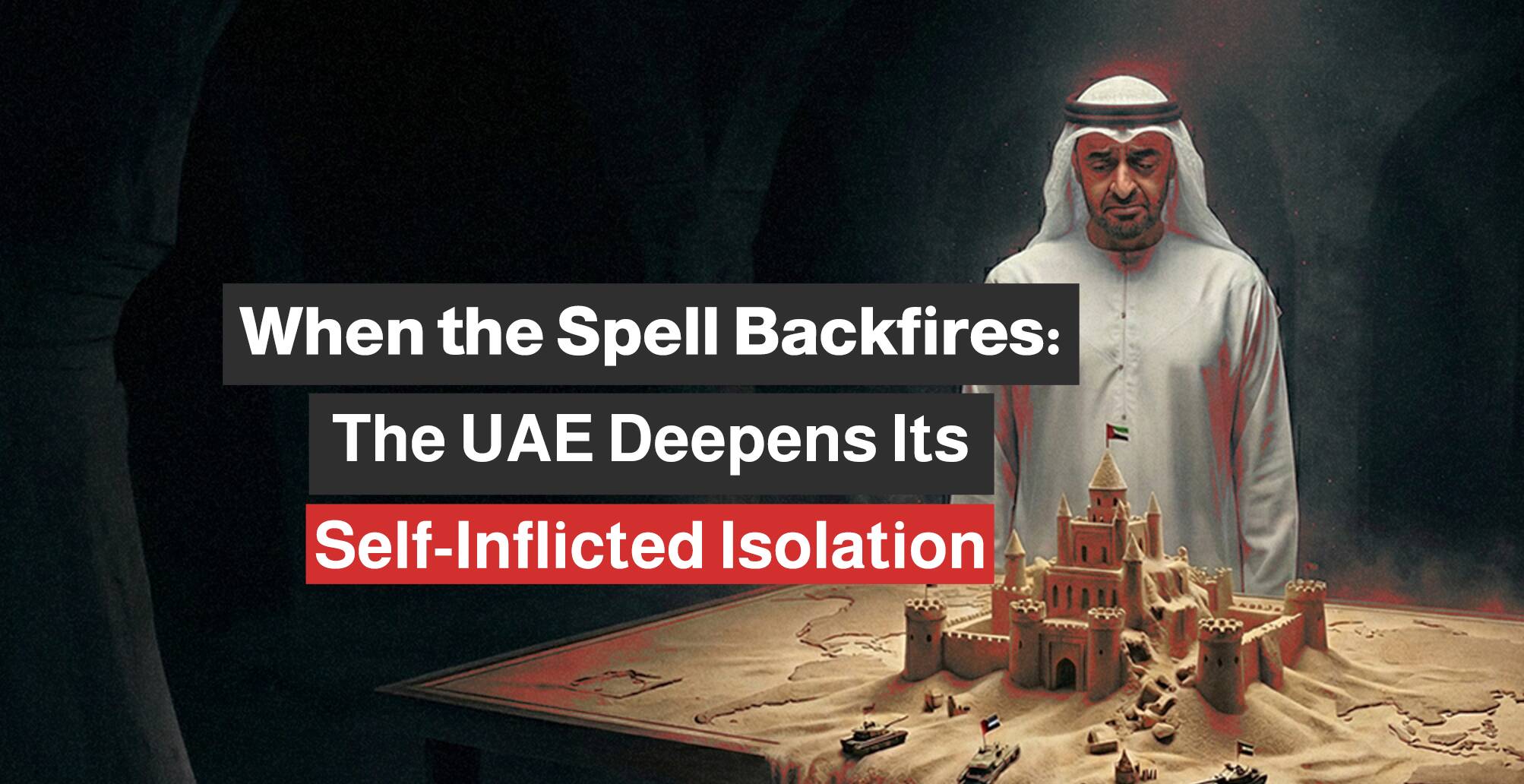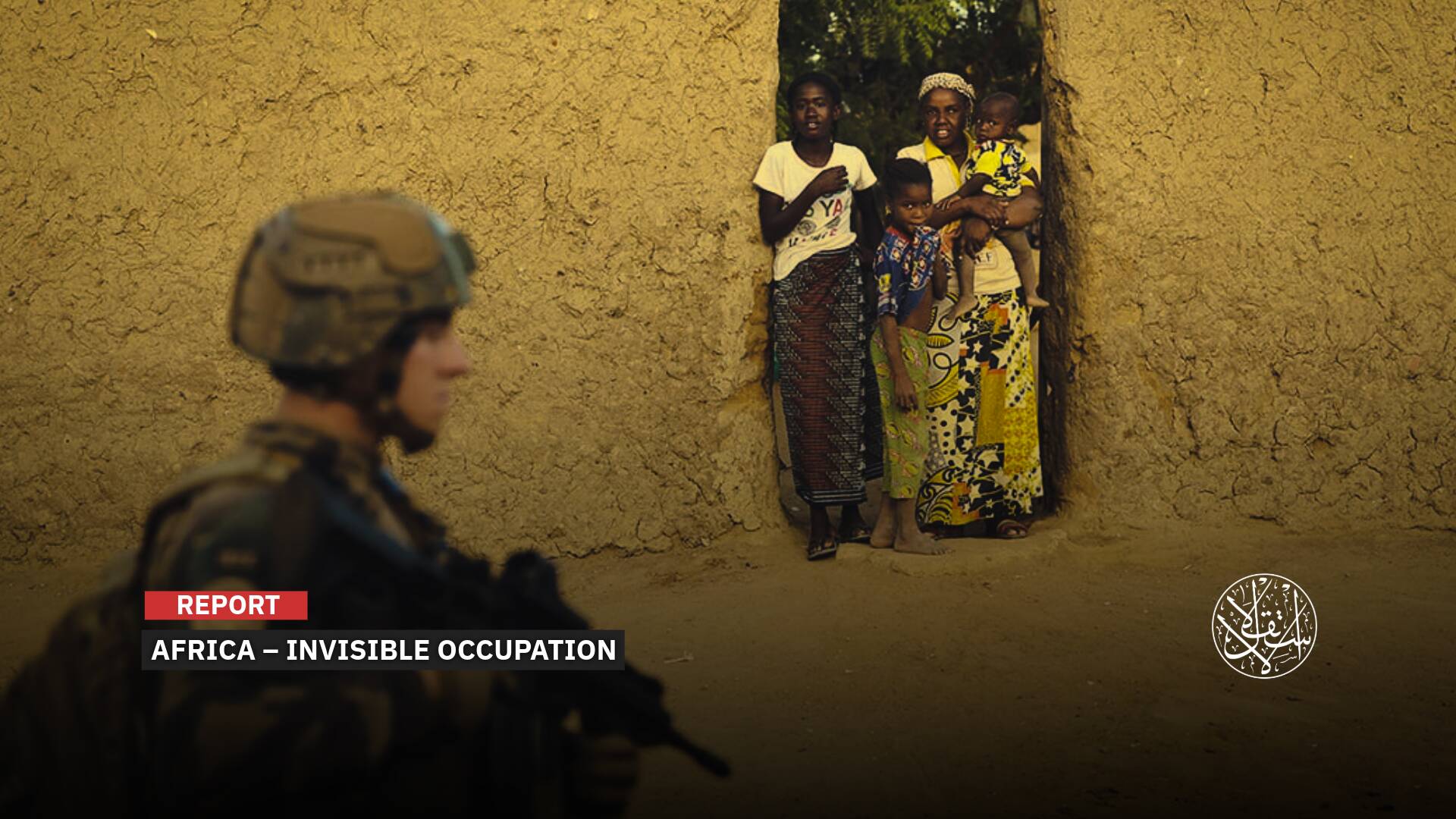'Palestine Action': Bare Hands Against the Bombs of the UK-Israeli Alliance
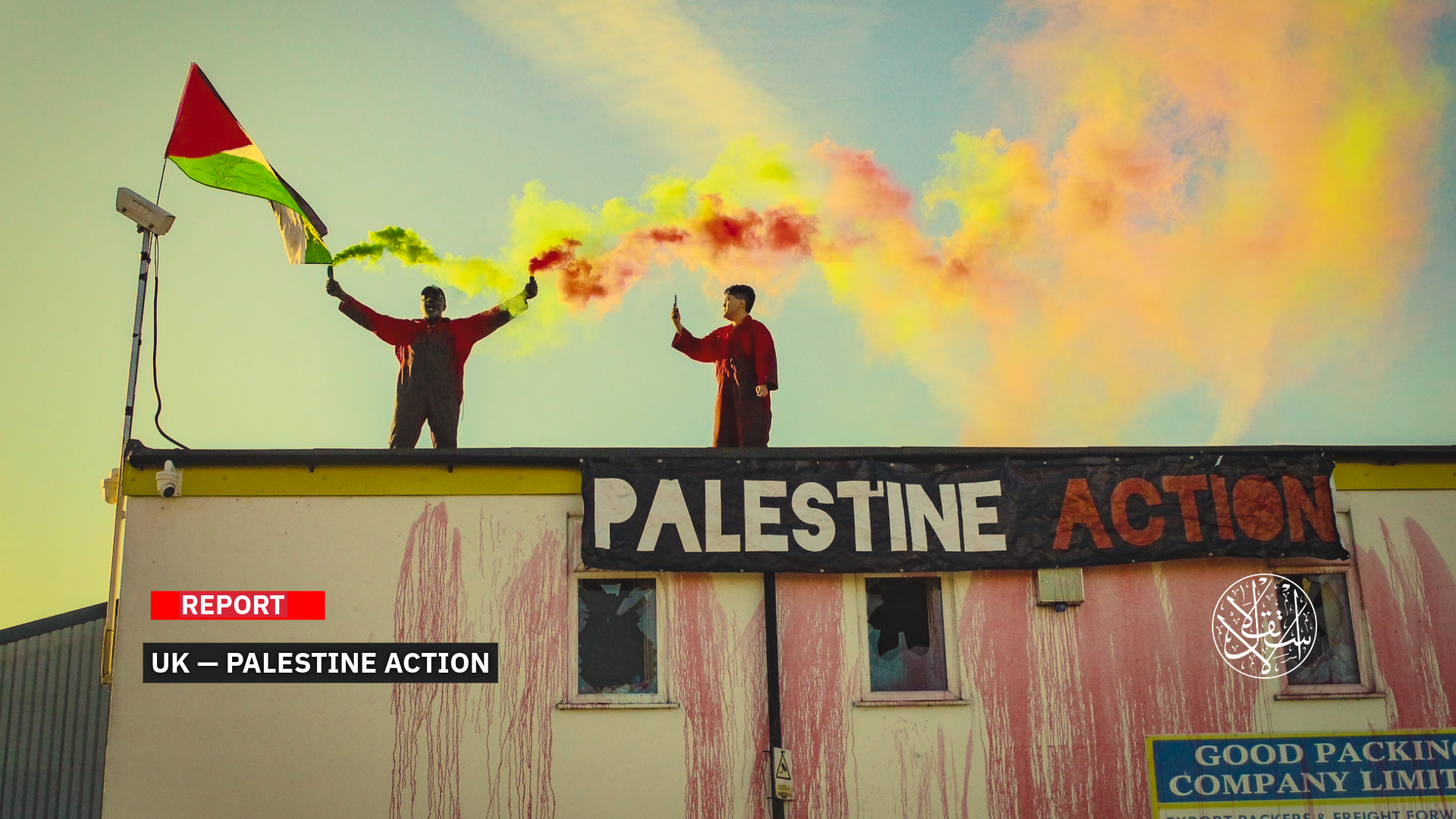
Palestine Action described the ban as authoritarian and dangerous.
In one of the most heavily involved European countries in supporting the Israeli Occupation both militarily and politically, Palestine Action has emerged as a leading force in civil resistance against “Israel.”
From the outset, it adopted direct protest and organized action against companies supplying “Israel’s” war industry, most notably the war giant Elbit Systems.
Founded in the United Kingdom in 2020, the movement quickly shifted from traditional demonstrations to organized civil disobedience by storming military facilities and disrupting weapons production.
It also defaced buildings linked to “Israel” with blood-colored paint and Palestinian symbols, scenes that gained wide media attention and unsettled British authorities.
This bold approach, however, came at a price. As the movement gained support from academic, union, and rights groups across the UK and abroad, authorities escalated arrests and legal actions, eventually imposing a full ban under counterterrorism laws. Many viewed the decision as an attempt to silence a nonviolent movement that exposed arms deals rather than engaged in violence.
Palestine Action found itself facing challenges in the streets, in courtrooms, and across media platforms.
Despite mounting pressure, it continued its central mission: to expose British complicity with the Israeli Occupation and redefine solidarity with Palestine as concrete resistance rather than slogans.
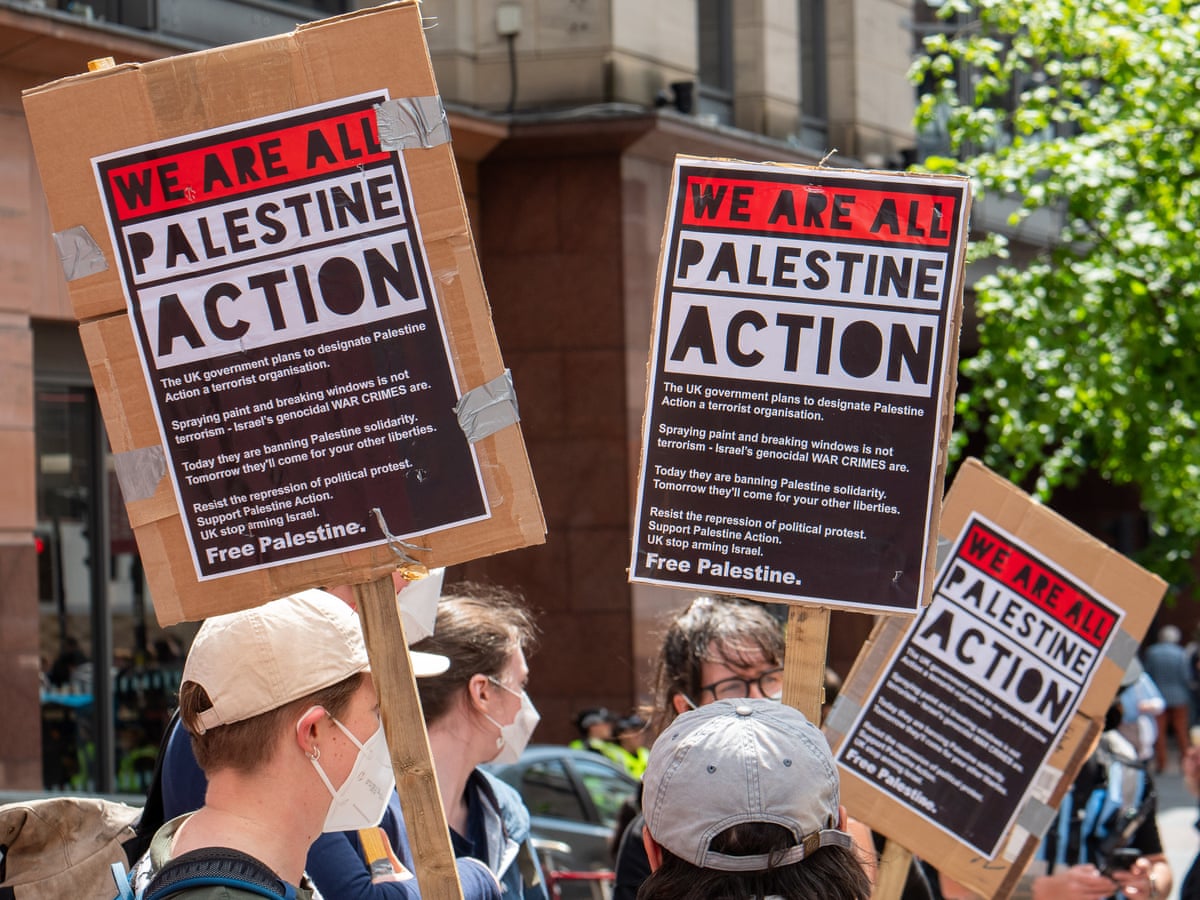
Notable Development
A legal turning point came on July 30, 2025, when the High Court in London granted activist Huda Ammori permission to file a full legal challenge against the government’s designation of the group as a “terrorist organization.”
The decision followed the government’s move on June 28, which marked an unprecedented step to criminalize one of the most influential anti-Israeli Occupation movements in Europe.
Judge Martin Chamberlain ruled that the case raised fundamental constitutional questions about free expression, the right to protest, and lawful assembly. He noted that the government’s ban may have imposed an excessive restriction on civil liberties guaranteed under British law.
The ruling comes at a time of growing tension between UK authorities and Palestine solidarity networks. After the ban, Palestine Action organized mass protests in London where demonstrators raised Palestinian flags and expressed open support for the Resistance. Police arrested 55 people on charges related to backing “a banned group.”
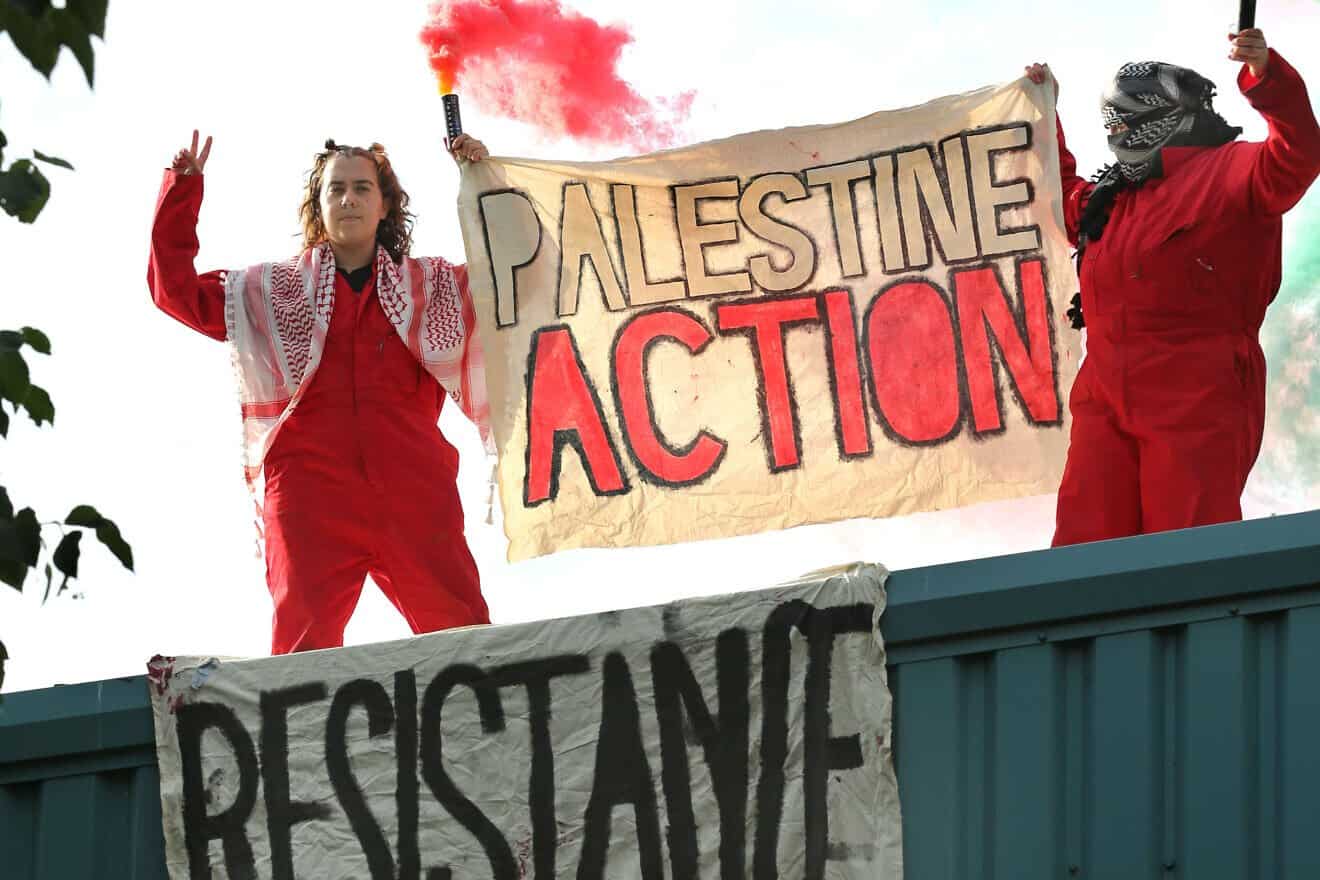
A Legal Battle
Although Huda Ammori’s request for a temporary suspension of the ban was rejected, the High Court’s decision to hear the appeal opens the door to a legal battle that could redefine how counterterrorism laws are applied in the United Kingdom. This is especially significant when such laws are used against movements engaged in human rights and international law advocacy.
The United Nations High Commissioner for Human Rights, Volker Turk, was among the most prominent international voices criticizing the ban. He described it as a troubling misuse of counterterrorism legislation and stressed that the decision was unnecessary and restricts the basic rights of hundreds of peaceful activists.
In response, Palestine Action described the ban as authoritarian and dangerous. The movement reaffirmed its commitment to pursuing both legal and public efforts to expose the British government’s support for “Israel’s” apartheid regime. This includes partnerships with arms manufacturers such as Elbit Systems, which provides the Israeli Occupation with technologies used directly in targeting civilians in Gaza and the West Bank.
The ban followed a high-profile operation by Palestine Action activists who infiltrated a Royal Air Force facility and caused damage to aircraft used in military logistics. The action was a symbolic rejection of the UK’s military cooperation with “Israel” during its ongoing aggression on Gaza, which since October 7, 2023, has killed or injured more than 206,000 people, most of them women and children.
Movement Background
Palestine Action was officially launched on July 30, 2020, following a bold first operation in which activists stormed the London headquarters of Elbit Systems and sprayed paint inside the building to protest the company’s role in arming “Israel.”
Since then, the movement has grown from a small group of activists into one of Europe’s most organized protest movements targeting the Israeli military capital and its Western networks.
The group was co-founded by Huda Ammori, a British activist of Palestinian and Iraqi descent, and Richard Barnard, a well-known leftist figure in solidarity and anti-capitalist circles.
In five years of intense activism, Palestine Action has carried out dozens of sit-ins inside military sites and corporate offices complicit in supporting “Israel,” achieving tangible material and media impact.
The most high-profile action took place in June 2025, when activists entered the Royal Air Force base at Brize Norton and successfully disabled two A330 MRTT military refueling planes by spraying paint on their engines.
The incident sparked a political and media uproar, prompting the UK Home Office to announce its intention to designate Palestine Action as a “terrorist organization.”
In early July, the House of Commons voted overwhelmingly in favor of the ban, with 385 votes in support and only 26 opposed. The House of Lords approved it the following day.
Since July 5, 2025, joining the movement, expressing support for it, or fundraising on its behalf has become a criminal offense under the UK Terrorism Act of 2000, punishable by up to 14 years in prison.
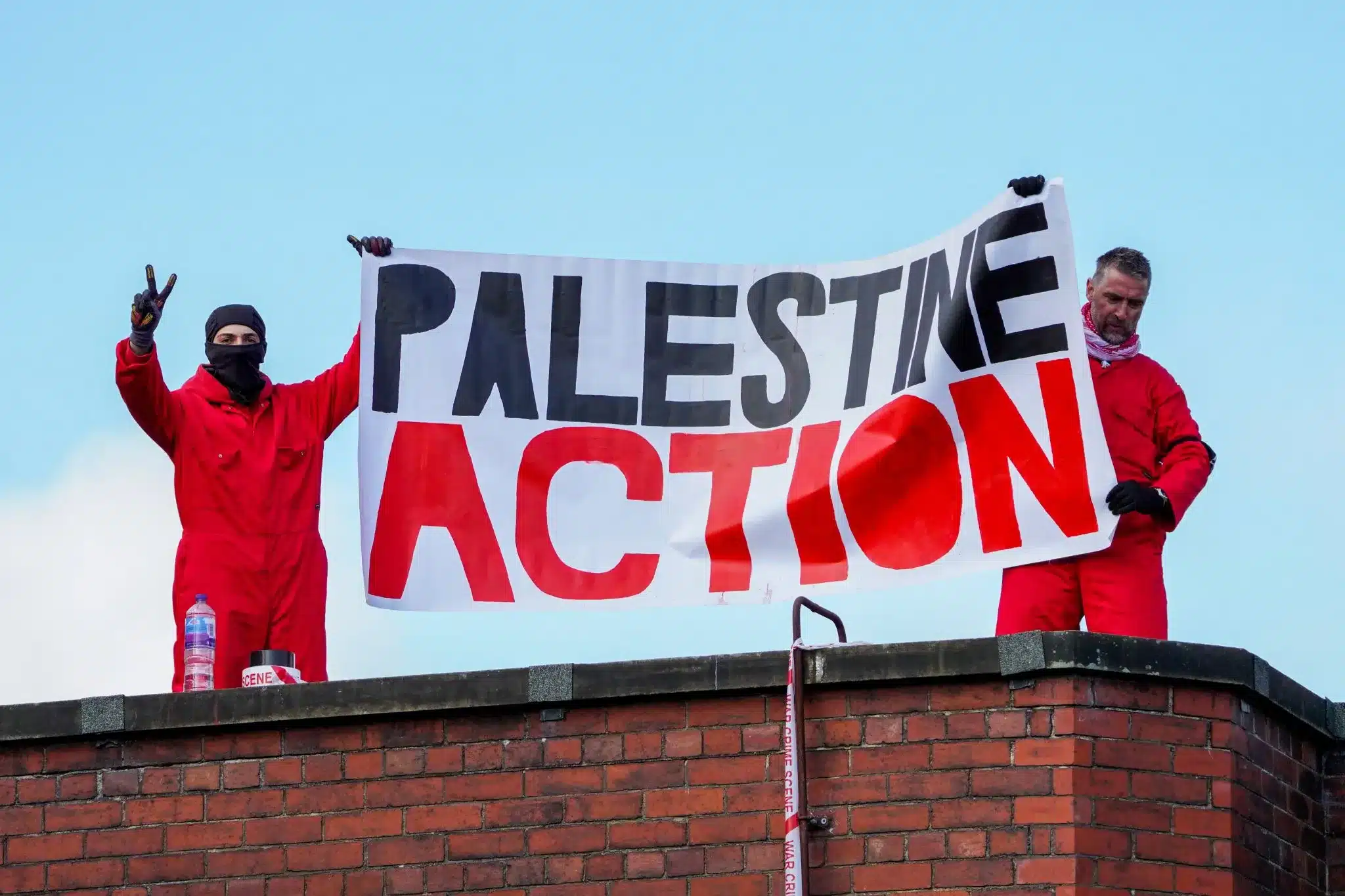
A Strong Track Record
Despite increasing security pressure, Palestine Action has continued its operations targeting weapons manufacturers and the logistical networks supporting “Israel.”
One of the most notable actions took place in May 2021, during the Israeli aggression on Gaza, when a group of activists climbed onto the roof of an Elbit Systems factory in Leicester and occupied it for six days. Ten activists were later arrested, but the court acquitted them under the “necessity” clause in British law.
The movement later carried out similar actions at Elbit sites in Bristol, Oldham, and Tamworth, often in collaboration with environmental and human rights groups.
In March 2025, four activists attacked an Elbit facility in Aztec West using a crane and a sledgehammer, causing damage to the building and facing charges of vandalism and assault.
In Somerset in 2024, activists sprayed red paint on a county government building to protest its lease to Elbit Systems.
Palestine Action has not limited its actions to Elbit. In June 2023, it targeted Hydrovane, a hydraulic equipment supplier, over allegations of indirect involvement with Elbit. The company later announced it would sever ties, according to a leaked statement.
The group also targeted Leonardo, an Italian arms manufacturer, vandalizing its offices in London and Crawley in protest of its sale of fighter jets to the Israeli Occupation.
Palestine Action even extended its pressure to academic institutions such as the universities of Cambridge and Manchester, targeting symbolic figures celebrated by these universities, including statues of Chaim Weizmann and images of Arthur Balfour, to demand divestment from arms companies.
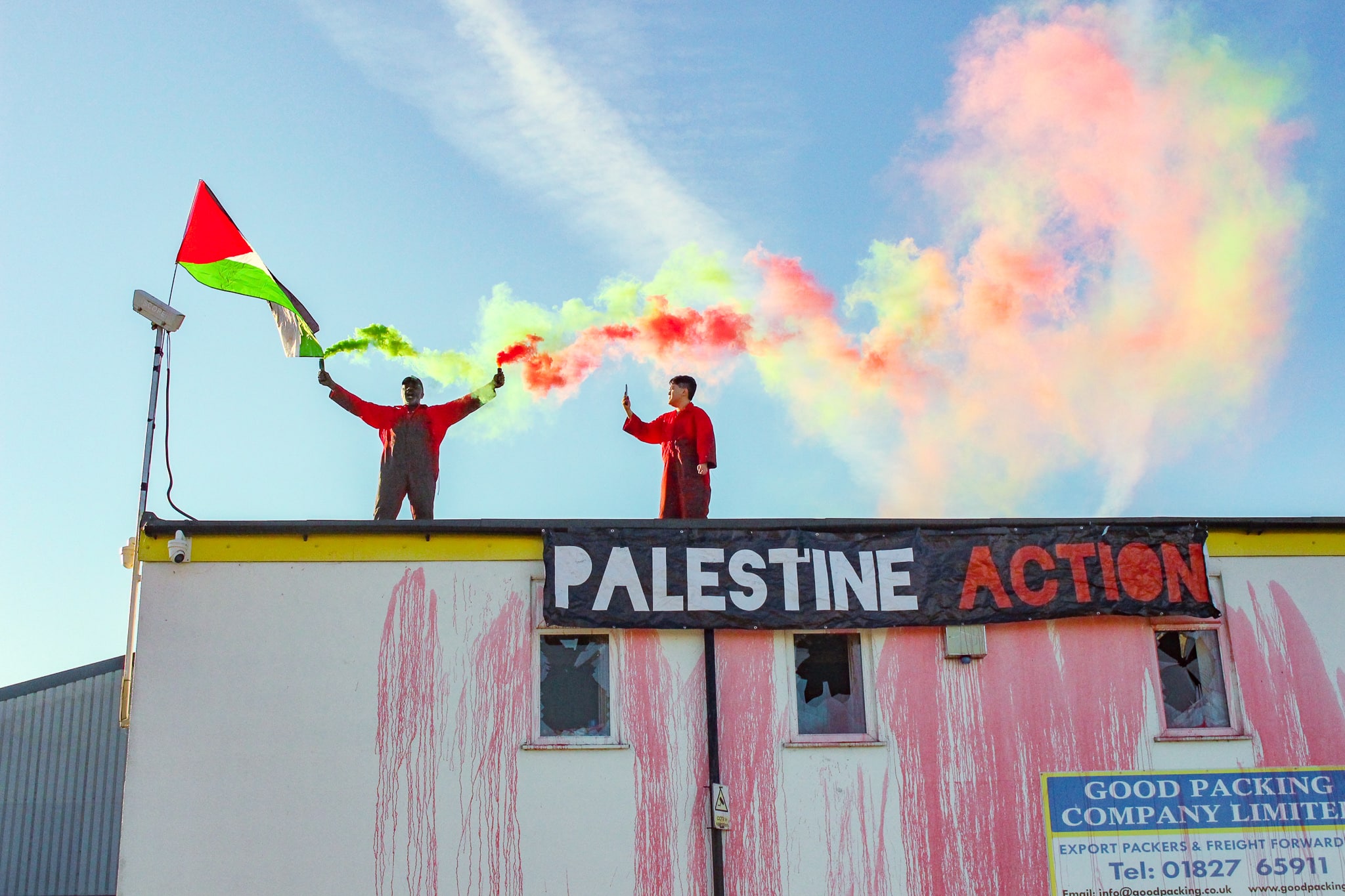
Secret Meetings
In September 2024, Palestine Action targeted the London headquarters of APCO Worldwide, a public relations firm representing Elbit Systems, by splashing red paint on the building and locking its doors.
Documents obtained by the movement through the Freedom of Information Act revealed that the British government held secret meetings to reassure Elbit about the campaign and pressured both the police and the Crown Prosecution Service to tighten their response to the activists.
Some records were fully redacted to avoid harming British-Israeli relations. Other documents show that the Attorney General and the Home Office explored using new laws restricting protests to criminalize the civil disobedience actions led by Palestine Action.
According to a report by The Guardian on April 29, 2025, efforts to label the group as “a terrorist organization” must be seen in the broader context of growing public support for Palestine in the UK and the intensifying debate over Western governments’ role in arming “Israel” during its ongoing war on Gaza.
For the movement, the ban will not stop its efforts. Instead, it sees it as an opportunity to take a more prominent role in exposing Western complicity, as stated in one of its public declarations.
Sources
- UK court rules Palestine Action may challenge ‘antiterrorism’ ban
- U.K. High Court Rules Co-Founder of Palestine Action Can Challenge Group’s Ban
- Activists say they have proof ministers tried to influence police over Israeli arms firm protests
- Palestine Action can challenge anti-terrorism ban: UK judge
- The UK Supreme Court Accepts Palestine Action’s Appeal Against Ban and Criticizes Misuse of Terrorism Laws [Arabic]
- Palestine Action Under Fire: Has Supporting Palestine Become a Crime in the UK? [Arabic]






